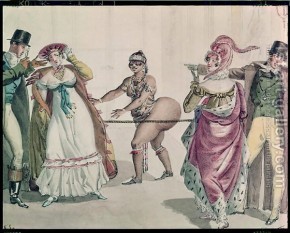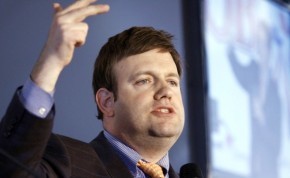Jamie Malanowski's Blog, page 7
January 28, 2014
KING IGNORAMUS
I don’t know who this toad Kevin O’Leary is, but somewhere in the great media world he has a job opining on the global situation. I don’t know what the rest of his body of work indicates, but this excerpt alone shows that he, and what’s more, whoever hired him, should be sent back to the saloon (or perhaps country club) where he was discovered. When his co-host reports a statistic from Oxfam that finds that the worth of the world’s 85 richest people is equal to that if the world’s 3.5 billion poorest people, O’Leary says “It’s fantastic. This is a great thing because. . . everybody gets the motivation to look up to the one percent and say I want become one of those people. I’m gonna fight hard to get up to the top.”
Think about it: the desperate poverty of billions is fantastic. Surely this is one of the most smug, self-satisfied, and ignorant observations ever made. Clearly the ingredient that is missing in many of those lives is not motivation. Often it is something like water. Or food. Motivation, my ass. This man has never known an instant of this sort of poverty in his life.
January 23, 2014
BEHIND IN HISTORY
 The media has been all over itself lately following Jen Selter, a young woman of no particular distinction other than having a nearly perfect butt. As the New York Post reported today, “The ample-curved Long Island native was working at a gym in March 2012 when she started taking photographs of herself working out. Since then, Selter’s gathered 2 million Instagram followers, more than half a million Facebook fans and 200,000 Twitter followers.” She recently signed a sports management deal with The Legacy Agency. “We believe she can be the next Jillian Michaels,” said TLA agent Andrew Witlieb, even though Selter, 20, has no formal fitness or broadcasting training.
The media has been all over itself lately following Jen Selter, a young woman of no particular distinction other than having a nearly perfect butt. As the New York Post reported today, “The ample-curved Long Island native was working at a gym in March 2012 when she started taking photographs of herself working out. Since then, Selter’s gathered 2 million Instagram followers, more than half a million Facebook fans and 200,000 Twitter followers.” She recently signed a sports management deal with The Legacy Agency. “We believe she can be the next Jillian Michaels,” said TLA agent Andrew Witlieb, even though Selter, 20, has no formal fitness or broadcasting training.
 Whether Selter has talent talent seems almost beside the point: when the public discovers an ass on a young woman, everything else disappears. Kim Kardashian used her butt to reestablish her family’s fortune; Jennifer Lopez used her shapely ass as the cornerstone of a lengthy show business career. This kind of sensational fascination extends at least back to the story of Saartjie Baartman, the so-called Hottentot Venus. Baartman–perhaps not her real name–worked as a nursemaid in Cape Town. According to African Queen: the Real Life of the Hottentot Venus, by Rachel Holmes, in 1810, when Baartman’s owners ran into financial difficulties, they decided to display Baartman in Europe, where curiosity about Africa was high. Writes Holmes, “a pretty maidservant with notable buttocks and a spotty giraffe skin were a winning combination on which to stake their future.” In other words, like Selter, JLo and Kardashian, she entered show business.
Whether Selter has talent talent seems almost beside the point: when the public discovers an ass on a young woman, everything else disappears. Kim Kardashian used her butt to reestablish her family’s fortune; Jennifer Lopez used her shapely ass as the cornerstone of a lengthy show business career. This kind of sensational fascination extends at least back to the story of Saartjie Baartman, the so-called Hottentot Venus. Baartman–perhaps not her real name–worked as a nursemaid in Cape Town. According to African Queen: the Real Life of the Hottentot Venus, by Rachel Holmes, in 1810, when Baartman’s owners ran into financial difficulties, they decided to display Baartman in Europe, where curiosity about Africa was high. Writes Holmes, “a pretty maidservant with notable buttocks and a spotty giraffe skin were a winning combination on which to stake their future.” In other words, like Selter, JLo and Kardashian, she entered show business.
 A trader named Pieter Willem Cesars bought Baartman and took her to Georgian London, where freak shows were a Piccadilly staple. Six days a week, Baartmen was displayed as a kind of “scantily clad totem goddess,” the Hottentot Venus, sex incarnate. She performed suggestive dances while wearing a flesh-colored silk costume that fit her like a second skin. She was a hit. Wrote the London Morning Post, “her contour and formation certainly surpass any thing [sic] of the kind ever seen in Europe, or perhaps ever produced on Earth.” Although British abolitionists helped her achieve freedom, Baartman’s life ended sadly: she and Cesars moved to Paris, where she became an alcoholic and a prostitute, and died at 26, a victim of sexual and racial exploitation. Thankfully, when such things happen today, agents are involved.
A trader named Pieter Willem Cesars bought Baartman and took her to Georgian London, where freak shows were a Piccadilly staple. Six days a week, Baartmen was displayed as a kind of “scantily clad totem goddess,” the Hottentot Venus, sex incarnate. She performed suggestive dances while wearing a flesh-colored silk costume that fit her like a second skin. She was a hit. Wrote the London Morning Post, “her contour and formation certainly surpass any thing [sic] of the kind ever seen in Europe, or perhaps ever produced on Earth.” Although British abolitionists helped her achieve freedom, Baartman’s life ended sadly: she and Cesars moved to Paris, where she became an alcoholic and a prostitute, and died at 26, a victim of sexual and racial exploitation. Thankfully, when such things happen today, agents are involved.
January 22, 2014
FRANK LUNTZ’S DISCONTENTS
 There is a sad, fascinating, hilarious article in The Atlantic about Frank Luntz, a “public-opinion gure” who has been a highly effective servant of the Republican party since the largely content-free, package-rich Contract With America triumph of 1994. In the article, Luntz reveals to Writer Molly Ball that he is having some sort of crisis–in this case, an existential crisis that strikes to the very core of his being. Luntz, who possesses the ad man’s minor genius of being able to come up with a phrase that crystalizes the inchoate feelings of the masses, has come to the conclusion that Americans not longer persuadable–that “America is too divided, President Obama too partisan, and the country in the grip of an entitlement mentality that is out of control.”
There is a sad, fascinating, hilarious article in The Atlantic about Frank Luntz, a “public-opinion gure” who has been a highly effective servant of the Republican party since the largely content-free, package-rich Contract With America triumph of 1994. In the article, Luntz reveals to Writer Molly Ball that he is having some sort of crisis–in this case, an existential crisis that strikes to the very core of his being. Luntz, who possesses the ad man’s minor genius of being able to come up with a phrase that crystalizes the inchoate feelings of the masses, has come to the conclusion that Americans not longer persuadable–that “America is too divided, President Obama too partisan, and the country in the grip of an entitlement mentality that is out of control.”
Ball captures Luntz deep in a funk of disillusion. Writes Ball, “It was what Luntz heard from the American people that scared him. They were contentious and argumentative. They didn’t listen to each other as they once had. They weren’t interested in hearing other points of view. They were divided one against the other, black vs. white, men vs. women, young vs. old, rich vs. poor. “They want to impose their opinions rather than express them,” is the way he describes what he saw. “And they’re picking up their leads from here in Washington.” Haven’t political disagreements always been contentious, I ask? “Not like this,” he says. “Not like this.” Luntz knew that he, a maker of political messages and attacks and advertisements, had helped create this negativity, and it haunted him. But it was Obama he principally blamed. The people in his focus groups, he perceived, had absorbed the president’s message of class divisions, haves and have-nots, of redistribution. It was a message Luntz believed to be profoundly wrong, but one so powerful he had no slogans, no arguments with which to beat it back. In reelecting Obama, the people had spoken. And the people, he believed, were wrong. Having spent his career telling politicians what the people wanted to hear, Luntz now believed the people had been corrupted and were beyond saving. Obama had ruined the electorate, set them at each others’ throats, and there was no way to turn back.”
I’ve met Luntz on two occasions, and he is impressively smart, the kind of guy who is so much smarter than anyone else in the room that he literally squirms with impatience when his clients are slow to see the end point that he knows they will eventually reach ten minutes ahead. But his disgruntlement is that of a pop tunesmith whose songs aren’t selling ever since thee kids started listening to that damn rock and roll. Luntz is a confirmed free marketeer, and he seems to be having trouble adjusting to the fact that many people have concluded that the free market has not delivered the prosperity it has promised.
Or maybe it does deeper. Luntz is nothing if not a creature of Washington, of the point of view that power derives from finding the right combination of words. But starting with Reagan, and then continuing on through Gingrich, DeLay, Palin, Bachmann, the Tea Party and so on, Republicans have used words to gain power–and then to delegitimate power. And as far as the entitilement culture goes, it is ingrained nowhere more deeply than on Wall Street.
Luntz has a squat build, a big slab of a face, and a mop of light-brown hair. His affect is by turns boyish and hangdog. People meeting him for the first time always comment on the loud sneakers he typically pairs with slacks or a suit. This is by design: He began wearing them, he says, to divert people’s attention from his considerable girth. He found he enjoyed collecting designer sneakers, and now has more than 100 pairs—all of which he wears, even though some are rare editions worth more than $1,000. Luntz is a collector. Before moving to Las Vegas this month, he spent most of his free time in a $6 million mansion in Los Angeles crammed with American political artifacts and politically themed decor. It also has a bowling alley. Luntz’s house in Northern Virginia is similarly crammed, but with pop-culture collectibles. (He also keeps an apartment in New York City.)
Luntz lives alone. Never married, he tells me he is straight (and that no reporter has ever asked him about his sexual orientation before), just unable to sustain a romantic relationship because of all the time he spends on the road. “My parents were married for 47 years. I’m never in the same place more than 47 minutes,” he says. When I point out he’s chosen that lifestyle, he says, “You sound like my relatives.”
Luntz did political polling for Pat Buchanan’s 1992 primary campaign and Ross Perot’s independent presidential bid, but he became truly famous when he hitched his star to Newt Gingrich, helping draft the Contract With America and advising Gingrich’s crusading Republican majority. He considers Gingrich and former New York Mayor Rudy Giuliani, another former client, his most important political mentors. In the ’90s, he became known as the man who could sell any political message by picking the right words. “Estate tax” sounds worthy and the right thing for a democracy to do, but “death tax” sounds distasteful and unfair. “Global warming” sounds scary, but “climate change” sounds natural or even benign. Luntz became a well-compensated speaker, TV commentator, and convener of on-camera focus groups, which he led with manic curiosity to shed light on what the people really thought about political debates and presidential speeches. “It’s not what you say,” goes his oft-repeated slogan, “it’s what they hear.”
Luntz is famous not just on television—he has talking-head contracts with both CBS and Fox News, a rare arrangement—but among the political and business elite. When he walks into the Capitol Hill Club, he is beset by Republican members of Congress wanting to talk to him and soak up his aura of celebrity. He boasts that he speaks to at least one Fortune 500 CEO every day. Yet, in his telling, he is still the little guy, the outsider, the schlub—half anxious, half awed by the trappings of power. He tells of being summoned for a conversation with Bill Clinton and being unable to enjoy the honor of the occasion because of the panic he felt at the president’s vise grip on his shoulder. “This is Bill fucking Clinton, asking me to deliver a message to the Senate majority leader, and I’m about to faint,” he recalls, ruefully. “Because I understand the significance of this conversation, and I am not worthy of it.”
Luntz’s work has always been predicated on a sort of populism—the idea that politicians must figure out what voters want to hear, and speak to them in language that comports with it. He proudly claims that his famous catchphrases, like branding healthcare reform a “government takeover” in 2010, are not his coinages but the organic product of his focus groups. The disheveled appearance, the sardonic wit, all add up to a sort of tilting against the establishment, an insistence that it listen to the Real People.
But what if the Real People are wrong? That is the possibility Luntz now grapples with. What if the things people want to hear from their leaders are ideas that would lead the country down a dangerous road?
“You should not expect a handout,” he tells me. “You should not even expect a safety net. When my house burns down, I should not go to the government to rebuild it. I should have the savings, and if I don’t, my neighbors should pitch in for me, because I would do that for them.” The entitlement he now hears from the focus groups he convenes amounts, in his view, to a permanent poisoning of the electorate—one that cannot be undone. “We have now created a sense of dependency and a sense of entitlement that is so great that you had, on the day that he was elected, women thinking that Obama was going to pay their mortgage payment, and that’s why they voted for him,” he says. “And that, to me, is the end of what made this country so great.”
“It seems like the Democrats are going so far overboard, and the Republicans are going nowhere. So I’m mad at both of them.”
To my ears, this sounds like rather standard-issue up-by-your-bootstraps conservative dogma. But to Luntz, it not a matter of left or right. He periodically comes under attack from the right for not toeing the Republican line, and has been critical of the party’s right wing. “It seems like the Democrats are going so far overboard, and the Republicans are going nowhere,” he tells me. “So I’m mad at both of them.” Increasingly, he says, he seeks to maintain relationships with members of both parties. His closest friendship in politics today, he says, is with a Democrat, Senator Michael Bennet of Colorado (disclosure: Bennet is the brother of Atlantic editor in chief James Bennet). “It’s not weird,” Luntz says. “He’s just a decent guy. We play foosball.”
Luntz’s political ideas, as far as I can tell, amount to a sort of Perotian rich man’s centrism, the type of thing you might hear from a Morning Joe panel or a CEOs’ retreat. We’ve got to do something about the deficit, for our children’s sake. We ought to have universal healthcare, but without forcing people to buy insurance through the government. We need immigration reform, but that doesn’t have to include a path to citizenship. The bankers who contributed to the financial crisis ought to be in jail, but we ought to stop demonizing the financial-services industry. To the tycoons who embrace them, these kinds of ideas are not partisan or ideological at all. They’re the common-sense plans we’d all be able to agree on if Congress would stop bickering and devote itself to Getting Things Done.
Most of all, Luntz says, he wishes we would stop yelling at one another. Luntz dreams of drafting some of the rich CEOs he is friends with to come up with a plan for saving America from its elected officials. “The politicians have failed; now it’s up to the business community to stand up and be heard,” he tells me. “I want the business community to step up.” Having once thought elites needed to listen to regular people, he now wants the people to learn from their moneyed betters.
Luntz’s populism has turned on itself and become its opposite: fear and loathing of the masses. “I am grateful that Occupy Wall Street turned out to be a bunch of crazy, disgusting, rude, horrible people, because they were onto something,” he says. “Limbaugh made fun of me when I said that Occupy Wall Street scares me. Because he didn’t hear what I hear. He doesn’t see what I see.” The people are angry. They want more, not because we have not given them enough but because we have given them too much.
Luntz is not sure what to do with his newfound awareness. He’s still best known for his political resume, but politics hasn’t been his principal business for some time: He still advises his friends here and there, but he no longer has any ongoing political contracts. (Corporations and television networks, not politicians, are his main sources of income.) He goes to as many NFL games as he can, where he sits in the owner’s box courtesy of onetime client Jerry Richardson, the owner of the Carolina Panthers, with whom he has developed a close rapport. “I don’t like this. I don’t like this,” he says, meaning D.C., the schmoozing, the negativity, the division. At football games, “People are happy, families are barbecuing outside, people are playing pitch and toss. A little too much beer, but you can’t have everything. They’re just happy and they’re celebrating with each other and it’s such a mix of people.” The first week of football season, he went to four games in eight days: Sunday night, Monday night, Thursday night, and then Sunday again.
Luntz would also like to break into Hollywood as a consultant, but he can’t get his calls returned. He can’t figure it out. He thinks it must be a partisan thing. In every other industry, he says, 90 percent of his presentations result in a contract. But in entertainment, he pitches and pitches and pitches (he wouldn’t tell me which studios or shows) and things seem to go well, but then there’s some excuse. Not this time. Not the right project.
If he could, Luntz would like to have a consulting role on The Newsroom, Aaron Sorkin’s HBO drama. “I know I’m not supposed to like it, but I love it,” he says. He feels a kinship with Jeff Daniels’ character, the gruff, guilt-ridden, ostensibly Republican antihero, who is uncomfortable with small talk and driven by a “mission to civilize.” “I love that phrase,” Luntz says. “That doesn’t happen in anything that we do.”
When he’s at home in Los Angeles, The Newsroom is the high point of Luntz’s week. He turns off his phone and gets a plate of spaghetti bolognese and a Coke Zero and sits in front of his 85-inch television, alone in his 14,000-square-foot palace. “That’s as good as it gets for me,” he says.
But today, Luntz is late for his afternoon talk to a D.C. lobbying shop. “Am I whining?” he asks. “Just say it if I am.” I tell him it sounds like he’s going through something very real, very human. “I am nothing if not human,” he says, breaking into a grin. “I’m super-human. I’m a human-and-one-fifth. My God, if I’m not careful, I’ll have to go not to the big and tall but the big and bigger store!” And then he walks away toward the elevator, off to do his soft-shoe routine for another audience of the rich and powerful.
December 31, 2013
A CANADIAN CHRISTMAS IN PEEKSKILL
77 WAYS TO PLAY `THE WEIGHT’
Having spent the better part of three years thinking and writing about Levon Helm, I have inevitably also devoted a lot of thought to The Weight, the mournful, elegiac, mysterious, inscrutable song written by Robbie Robertson and made famous by The Band. Somehow over the years, it evolved from a simple if elusive pop song to an existential hymn. Imbued by the grace that radiated from Levon as he stoically faced the struggles of his final decade, the song has acquired a larger dimension. In singing it, out loud and usually in company, we embrace the song’s lesson: to to accept the weight, to carry it without self-pity or terror, but with joy. In this list, many, many artists offer themselves to the song; it’s q quite beautiful to grasp that it has come to mean so much.
1.The Band at Woodstock
2. Easy Rider
http://www.youtube.com/watch?v=JpH6u4...
3.The Staples Singers
4. The Grateful Dead
http://Gww.youtube.com/watch?v=XWL4JH...
5.Levon Helm and Richie Havens
6. The Wallflowers and Eric Clapton
7. Jimmy Page, The Edge and Jack White
8. Weezer
9. Emmylou Harris and friends
10. The Decoys
11. Warren Haynes and Dr. John
12. Grant Lee Philipd and Avid McMullin
13. Trampled by Turtles
14. The Band at the Isle of Wight Festival
15. Gillian Welch and the Old Crow Medicine Show
16. Bruce Springsteen
17. The Punch Brothers
18. Waylon Jennings
19. Little Feat
20. Mavis Staples, Nick Lowe and Wilco in rehearsal
21. Mavis Staples, Nick Lowe and Wilco performance
22. Eddie from Ohio
23. Train, Gavin DeGraw et al
24. Mad Driving Barons
25. Mumford and Sons
26. Black Keys and John Fogarty
27. The Levon Helm Band at the Ryman
28. The Ringo Starr All-Starr Band
29. The Band at the New Orleans Jazz Festival
30. Jimmie Barnes
31. Tragically Hip and Kathleen Edwards
32. Jensen Ackles
33. Uncle Tupelo
34. The Lumineers
35. The Grateful Dead and the Allman Brothers
http://www.youtube.com/watch?v=ssPYiXU
36. Aretha Franklin
37. James Maddock and Willie Nile
38. Lee Anne Womack
39. Brian Fallon of Gaslight Anthem
40. Levon Helm, John Anderson, Vasser Clements
41. Cheers Elephant
42. A Group Called Smith
43. James Dieffenbach and the Duke’s Men
44. Levon Helm and Elvis Costello
http://www.youtube.c/watch?v=uyXOjiVhH5U
45. The Band on Letterman
46. Sue Cunningham et al
47. At Merlefest
48. Conan O’brien
49. King Curtis
51. Levon Helm and Wilco
52. The Fundamentals
53. Nic Mingie
54. Vagabonds
55. Panic in the disco
http://www.youtube.com/watch?v=jYbWsJ...
56. Mumford et al
57. Allman, Weir, Tedeschi
58. The Band and clapton
http://www.youtubEric C.com/watch?v=vElZF9K06e0
59. Bucket List
60. Half Dead Music
61. Mavis Staples and Billy Bragg
62. Levon Helm, John Hiatt, Mark Colie
63. The Chambers Bros
64. Spooky Tooth
65. The Levon Helm Band and the Black Crows
66. Travis
67. Eddie Vedder
68. The River and the Road & Dogwood and Dahlia
69. The Last Waltz Revisted
70. Jim James and the Levon Helm Band
71.Cassandra Wilson
72. rocKwiz
73. Bob Dylan, Jeff Tweedy et al on the 2013 Americanarama Tour
74. The Band The Last Waltz
75. Love for Levon finale
76. The Grammy Awards tribute
77A. Gentlemen of the Road
77B. The Levon Helm Band
BEST BOOKS
On December 20th, Janet Maslin of The New York Times listed her Ten Favorite Books of 2013. Among them:
“JOHNNY CARSON by Henry Bushkin (Eamon Dolan/Houghton Mifflin Harcourt). That rare celebrity tell-all by an author who knows whom and what he’s talking about. Perhaps Mr. Bushkin, a young lawyer in 1970, should have wondered why a huge star like Carson would recruit him and make him a confidant, tennis partner, drinking buddy and more, but he didn’t understand Hollywood’s pecking order — or what yes-men and enablers are for. Undoubtedly self-serving, this book is still a close look at how show business power corrupts, and it is thoroughly credible. You may be shocked by Mr. Bushkin’s treachery or by Carson’s capricious cruelty. Still, this is the dishiest read of the year.”
Meanwhile, in its December 30 issue, People magazine named Johnny Carson its sixth best book of the year. “The fascinating, philandering, fiercely private star comes alive in Bushkin’s bio.”
THE ARMY WAR COLLEGE TAKES A STEP
On December 18, Fox News reported that the U.S. Army War College in Pennsylvania is considering removing prints that depict Robert E. Lee and other Confederate generals after at least one official questioned why the school honors those who fought against America. The college is currently conducting an inventory of its paintings and photographs, and to categorize them. “There will be change: over the years very fine artwork has been hung with care – but little rationale or overall purpose,” US Army Major General Tony Cucolo, the commandant of the college, said in a statement posted on the school’s website Wednesday afternoon. “I will… approach our historical narrative with keen awareness and adherence to the seriousness of several things: accurate capture of US military history, good, bad and ugly; a Soldier’s life of selfless service to our Nation; and our collective solemn oath to defend the Constitution of the United States (not a person or a symbol, but a body of ideals),” he added. “Those are the things I will be looking to reinforce with any changes to the artwork.
College Spokeswoman Carol Kerr told the newspaper that at least one official — who was not identified – asked the administration why the school honors generals that were enemies of the U.S. Army. “There will be a dialogue when we develop the idea of what do we want the hallway to represent,” she said. “[Lee] was certainly not good for the nation. This is the guy we faced on the battlefield whose entire purpose in life was to destroy the nation as it was then conceived.”
So far, this sounds like a step in the right direction.
WORSE THAN BROKEN
Last night on 60 Minutes (December 1st) Amazon chief Jeff Bezos said the company is testing delivering packages using drones. The idea would be to deliver packages as quickly as possible using the small, unmanned aircraft, through a service the company is calling Prime Air, the CEO said.
This idea will never happen, of course. Millions of drones swooping above your head? Occasionally falling out of the sky?
Earlier this year, Bezos bought The Washington Post, committing himself to figuring out how to make intelligent news reporting a profitable concern in the years to come. I don’t know which will prove more daunting: trying to get people to apy what they have learned in the last decade to steal, or how to fly drones around without banging into telephone lines, dogs, and ;et’s face, the 50 million other drones that will darken our skies as soon as this thing gets off the ground.
If Bezos really wants to be a giant killer, he needs to find a bigger target. I suggest that he design a new democratic government. Our institutions are fundamentally broken, corrupted by money, and totally out of date with what we the people today value.
Look at Bezos’ company. Amazon. Now that is a company completely in tune with what we value now: choice, selection, service, low cost, efficiency. Amazon is dedicated to the proposition that people should get what they want. They are so dedicated, they are looking at drones.
Now, the government is not in the same business as Amazon. For one thing, if you can’t get what you want at Amazon, it’s not likely that amazon will be held to blame. It’s either not avoidable, or you can’t afford it. If you can’t get something from the government that you want, you’ve got a lot of people you can blame. Assigning and avoiding blame has become the real business of government, not helping people get what they want. Today we value results. Congress is in the business of delivering results to a chosen few.
We no longer live in a Madsionian world, and the Madisonian checks and balances no longer prevent the usurpation of government, but abet it. You wonder why Congress has an eight percent approval rating? It’s because they’ve earned it.
PETER KAPLAN 1954-2013
The writer Penelope Green once used the term “our set’’ to describe all of us who came up together in the early eighties, and I knew exactly what she meant. Whether we were at Spy or The New York Observer or 7 Days or Wig Wag or one of the established magazines, we were all members of the Class of the Mid Eighties, and we watched what each other did like hawks..
It’s kind of amazing that during the whole of our coeval life and work spans, I met Peter Kaplan, one of the star performers of our set, only a small handful of times. I have to believe that was by mutual choice; Peter, who died on November 29th, was an exuberant type, but he ran Manhattan Inc. and the Observer, he never gave me any assignments nor accepted any of my pitches, and I have to assume that was simply because he didn’t like my act. Fair enough. Enough other people did. And apparently he liked plenty of other people’s stuff. Their remembrances of his special grace made that seem as though that his enthusiasm was one of the great beneficences a writer could know.
One of the earliest times I met him was in 1983 or 1984, when he was helping Jane Amsterdam run Manhattan Inc., and I went to see him. I don’t remember a great deal about that meeting, except that he wasn’t buying what I was selling, and worse, that maybe the whole meeting was just a courtesy to our mutual pal Sam Campbell, and that Peter didn’t expect ever to have an interest in me. But at some point in our talk, he began to enthuse over an article he had read, a piece that probably ran in his magazine, about a real estate developer. The developer was an unpolished Jewish businessman, probably around seventy, who along with his properties ran an import business. Peter read from the piece to me, stressing a quote from the developer in which he offered the visiting reporter some of his imported goods. “Have a Havana,’’ the gruff, garrolous businessman said, “and a banana.’’
Peter repeated that line three or four times, chortling louder each time. “Have a Havana, and a banana.’’ He loved it, but it was a dog’s whistle to me. I just didn’t hear it.
And then, some years later, I did.
Our industry is shattered, our craft is disappearing, and now our set has begun to die.
POPENOMICS
On November 26, Pope Francis framed as a call for Catholics to embrace a new evangelization. Prominent among his remarks was this stinging critique of the inequality tolerated by western capitalism. Said the Pope::
Just as the commandment “Thou shalt not kill” sets a clear limit in order to safeguard the value of human life, today we also have to say “thou shalt not” to an economy of exclusion and inequality. Such an economy kills. How can it be that it is not a news item when an elderly homeless person dies of exposure, but it is news when the stock market loses two points? This is a case of exclusion. Can we continue to stand by when food is thrown away while people are starving? This is a case of inequality. Today everything comes under the laws of competition and the survival of the fittest, where the powerful feed upon the powerless. As a consequence, masses of people find themselves excluded and marginalized: without work, without possibilities, without any means of escape.
Trickle-down economics and market worship are slammed:
In this context, some people continue to defend trickle-down theories which assume that economic growth, encouraged by a free market, will inevitably succeed in bringing about greater justice and inclusiveness in the world. This opinion, which has never been confirmed by the facts, expresses a crude and naïve trust in the goodness of those wielding economic power and in the sacralized workings of the prevailing economic system. Meanwhile, the excluded are still waiting…. This imbalance is the result of ideologies which defend the absolute autonomy of the marketplace and financial speculation. Consequently, they reject the right of states, charged with vigilance for the common good, to exercise any form of control. A new tyranny is thus born, invisible and often virtual, which unilaterally and relentlessly imposes its own laws and rules.
It was fascinating, in the aftermath, to watch the right try to avoid what the Pope said. One guy said he agreed with the Pope’s attack on materialism. That’s not what the man said.








